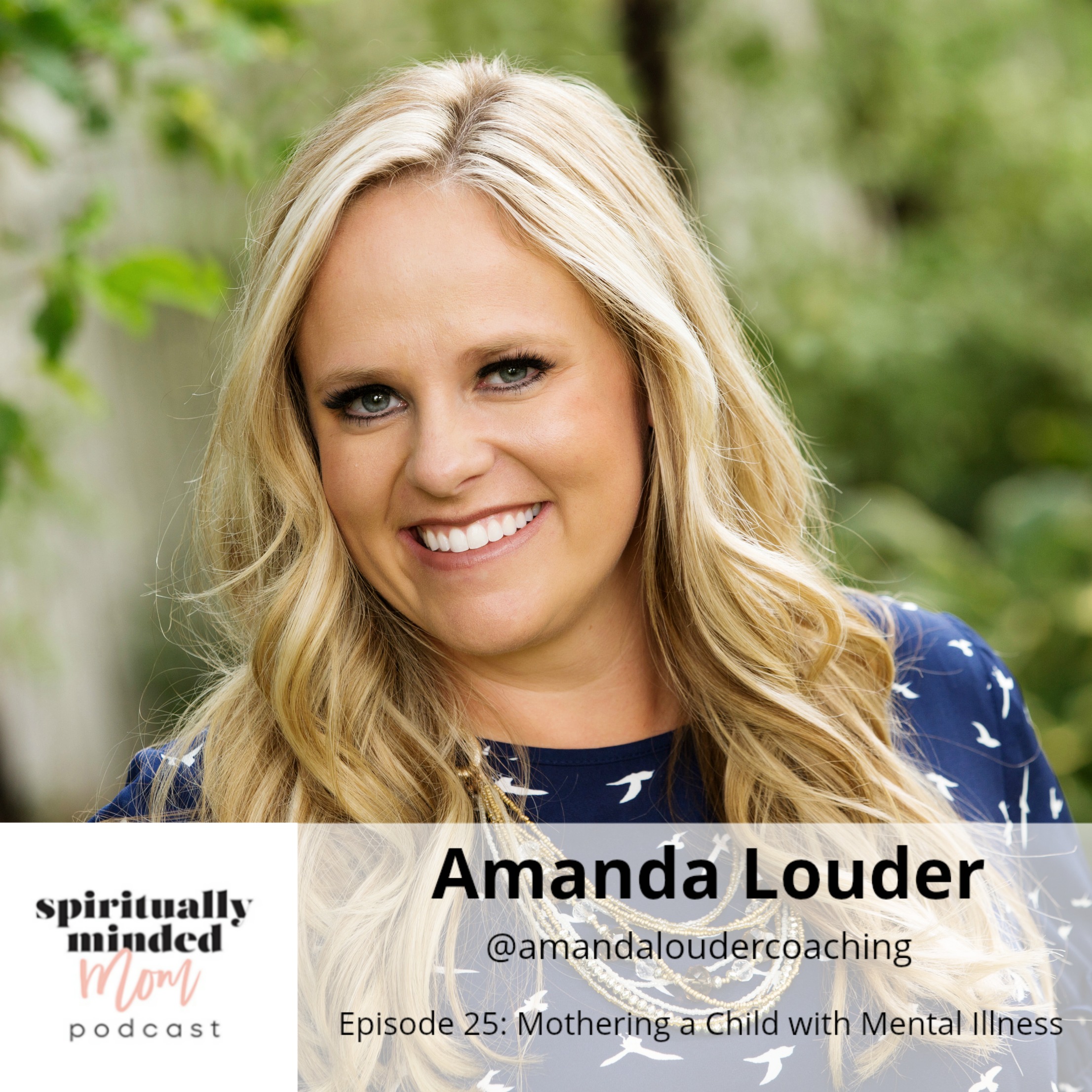
The word SHOULD indicates an expectation, an obligation, a duty, and is typically used when criticizing someone. And usually when we “should” on others we have an expectation that they be LIKE US. And not only do we think they should be, think, or do like us, we expect them to be the perfect version of us. We have a personal set of rules of how people should conduct their lives. And when they don’t, it totally sets us up for anger, negativity, and disappointment. Talk about a set up for failure! Right?
But when we drop the “shoulds” or the expectations we have of people, and just LOVE them we are able to create much better results in our lives, better relationships, and better marriages.
Show Notes:
Follow Amanda on Facebook and Instagram.
Join Amanda’s Private Facebook Group.
References for this episode:

Spiritually Minded Mom – Episode 25: Mothering a Child with Mental Illness
Show Summary:
I want you to think about your spouse and when they do something that you think SHOULDN’T be doing or they DON’T do something that you think they SHOULD be doing.
For example – Do you think your spouse SHOULDN’T be watching pornography? Or they SHOULDN’T be playing video games so much? Or maybe they SHOULD be helping out more around the house? Or they SHOULD compliment you more?
So the word SHOULD indicates an expectation, an obligation, a duty, and is typically used when criticizing someone.
Whenever we expect something – anything – of others, we set ourselves up for disappointment.
And usually when we “should” on others we have an expectation that they be LIKE US. And not only do we think they should be, think, or do like us, we expect them to be the perfect version of us. We have a personal set of rules of how people should conduct their lives. And when they don’t, it totally sets us up for anger, negativity, and disappointment. Talk about a set up for failure! Right?
So what I want to offer to you today is that when we have expectations or “shoulds” that are not met, from our spouse or someone else, it creates an internal reaction in us. But that internal reaction is NOT about the other person and what they did or did not do. It’s about us.
So a question to ask yourself is “How does the belief that someone should be different than they are serve us?”
So let’s plug it into our CTFAR model. And if you haven’t listened to Episode 17 – I suggest you do that to understand this part fully.
Let’s do a scenario –
So let’s say our circumstance (and remember a circumstance is just the facts),
Circumstance: – Husband played video games for 6 hours last night and didn’t come to bed until 3:00am
And our thought is
Thought: – He shouldn’t do that because…
and fill in the blank
- it’s going to fry his brain
- he’s going to be so tired at work tomorrow
- he should have spent time with me
and that thought makes us feel
Feelings: angry, resentful, disrespected, ignored, irritated or a host of other negative emotions
and when we feel all those negative emotions, how are we showing up in that relationship?
Action: Tell him he shouldn’t stay up so late playing video games, tell him all the reasons why, tell him how upset we are. Or maybe in your anger you just withdraw from the relationship
and our Result is
Result: You still feel angry and the situation doesn’t actually get resolved.
Because when you come to him ANGRY and FRUSTRATED is he going to just be like “oh you are so right, that was a stupid thing to do” no! He’s going to be defensive and get angry and your anger about it.
Or if you withdraw then he thinks you don’t care and does it again the next night because you don’t care anyway…
When we use “should” on other people, we are very demanding and unpleasant to be around. And it makes life miserable for us and others. It creates anger and resentment. And that is NOT what we want in our marriage or other relationships.
So how do we approach this in LOVE?
7 ways that you can show love instead of “shoulding” on someone.
- We become AWARE of our “shoulds” and how we are putting that on other people. We can’t fix what we don’t acknowledge.
- Now that we have an awareness, when we see ourselves getting revved up, hit the pause button. It might be mid-sentence it might be 2 days later…but just PAUSE where you are. If the word “SHOULD” comes out of your mouth in as a thought in your head…hit pause right there.
- THINK. Think about where this reaction, this expectation, is coming from within US. Question it. How does the thought “He should be this way, or act this way or do this” serve us?
- Practice Compassion. We are trying to do our best, we need to assume others are too. Remember that we are all human.
- Take responsibility for it. Regardless if we think we are right or wrong (which is subjective anyway) there is always something we can do differently next time. Or now. We can always ask someone if they can or would do something different next time, but we need to also be ok with their answer. Don’t have expectations, make requests instead.
- Be grateful! Trust that there is something in the situation that will allow us to grow if we are willing to look at it another way.
- Apologize! If we can kick our ego to the curb and give a heartfelt apology for the way WE behaved, then that is definitely showing love.
So in our previous scenario employing these tactics we can
- Be aware that we don’t think its ok to stay up until 3am playing video games, but maybe he thinks its fine.
- That when we are aware, we need to stop ourselves from placing our expectations about it on them.
- Question why we think its such a problem FOR US…
- Practice compassion. Maybe he had a really hard day at work and didn’t want to burden you with it, so he did what he needed to do to decompress. He’s a big boy, he’ll deal with the consequences.
- We can express ourselves in kinder ways and say “Hey, I would really love to spend time with you in the evenings and I can’t do that when you are up late playing video games. Next time, can we have some couple time first?” And if he says no, be ok with that.
- Be grateful for the time we have to spend some time with ourselves grow in a way that is important for us. Read scriptures, read a book, have a bath.
- Apologize for behavior if necessary. “I’m sorry I got mad about you playing video games. It’s really your decision and I need to honor that.”
And I hear you saying “But Amanda, he SHOULDN’T watch pornography…we know that it is bad and the church teaches us how much it hurts us and our relationships.” And maybe that is TRUE, but maybe we need to use some of those tactics and employ LOVE and COMPASSION and UNDERSTANDING and figure out the WHY he is watching pornography instead of placing our expectations or the church’s expectations on him. And shaming him for his choices.
So I want you to sit down with a piece of paper and a pen and write down all the things you think your spouse SHOULD be. And then I want you to question them. All of them. Are those beliefs serving you?
We talk a lot about the way our brains work and one of the things our brain is really good at is finding evidence for what we believe. So if we have a belief that our husband is lazy and he SHOULDN’T be that way our brains will constantly be providing us with evidence to PROVE that he indeed is LAZY. If we believe our husband is a hard worker and we LOVE that about him, our brains will find all the evidence it needs to prove that he is a hard worker.
To give you an example of this – have you ever been in the market for a new car and you decide you want a specific type of car and then you start seeing that exact car everywhere? Or what if you are looking for a new house. You all of the sudden start seeing “For Sale” signs everywhere. That is your brain looking for evidence. It does the same things with ANY belief.
So when I find myself “shoulding” on someone, I try to redirect my brain. So when my brain offers me the thought of “They shouldn’t do that, or they shouldn’t be like that” I choose to redirect it to o”Of course they should, because they ARE and I love them anyway” or something like that.
So let me give you an example with my son. Last week he stayed out really late on Saturday night. He’s 18 and graduated, so that isn’t unusual. But then he made the decision to not get up for a meeting he was supposed to go to on Sunday morning. And then he was late for church later that morning. My brain of course offered me the thought “He shouldn’t do that. He should get up on time for his meeting and he should be to church on time.” Now if it just went with that thought – which in the past I have… I get angry, irritate, frustrated, upset. I usually end up yelling at him, and I’m in a grumpy mood the rest of the day. But this time when he did, I caught myself in that thought. And I said “I don’t know why he did that. I don’t know why he thinks its ok. I’m going to sit and talk with him about later. But I know that I don’t want to yell at him. I want to just show him that I love him.” So later that night, I sat down with him and had a great conversation about why I think its important to for him to go to his meetings and be on time. And I found out why he was having a hard time with it. And instead of it being me yelling at him, it was a loving and productive conversation with my son. Awesome right? I felt really good about that.
So when we are able to drop our demands, and change our shoulds into preferences, amazing benefits often result.
The next thing I wanted to talk about is the “shoulding” we do to our selves.
The psychologist Clayton Barbeau came up with the term “shoulding yourself” to describe this cognitive distortion. – telling yourself that you have an obligation to do something different from what you are doing.
Shoulding on ourselves also creates negative feelings and guilt, and often shame.
A “Should” leads to guilt and shame. A Choice leads to Action.
I think guilt can sometimes be good. It’s like a stop sign. It makes us feel bad, but helps us make different decision in the future.
Now shame on the other hand…is not so good. Shame often accompanies guilt. But shame moves us from “I shouldn’t have done that, but I’m human and make mistakes” to “I am a mistake.”
Shoulding on ourselves often looks like comparison. “They are better than me.” or “They do that better than me.” or “I SHOULD be better like them” or something along those lines.
But comparison takes us down the path of ranking people. That some people are inherently more valuable or less valuable because of who they are or what they have or haven’t accomplished in this life. Instead of the what is true, that EVERYONE’s value is exactly the same. Their worth is not based on who they are or what they have done, but it is infinite because they are a child of God. Your worth is infinite because you are a child of God.
So when you are “shoulding” on yourself, you need to show the same kind of love, use the same steps that we talked about earlier, for YOURSELF!
A gentler, more empowering word to use with ourselves instead is: could. I could do things differently. I could do it this way next time instead. Could is much more loving and kind.
So stop “shoulding” on others and yourself. Love is the answer. Love is always the answer.



